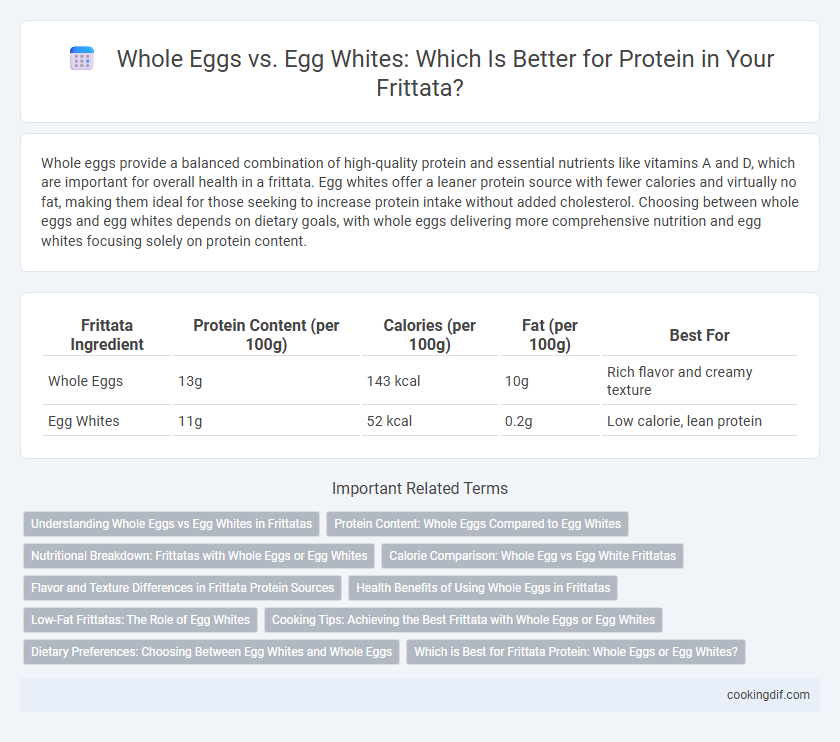Whole eggs provide a balanced combination of high-quality protein and essential nutrients like vitamins A and D, which are important for overall health in a frittata. Egg whites offer a leaner protein source with fewer calories and virtually no fat, making them ideal for those seeking to increase protein intake without added cholesterol. Choosing between whole eggs and egg whites depends on dietary goals, with whole eggs delivering more comprehensive nutrition and egg whites focusing solely on protein content.
Table of Comparison
| Frittata Ingredient | Protein Content (per 100g) | Calories (per 100g) | Fat (per 100g) | Best For |
|---|---|---|---|---|
| Whole Eggs | 13g | 143 kcal | 10g | Rich flavor and creamy texture |
| Egg Whites | 11g | 52 kcal | 0.2g | Low calorie, lean protein |
Understanding Whole Eggs vs Egg Whites in Frittatas
Whole eggs contain both protein and essential nutrients like vitamins A, D, and B12, providing a balanced nutritional profile crucial for a wholesome frittata. Egg whites offer a high protein content with minimal fat and calories, making them a popular choice for those seeking leaner frittatas. Understanding the differences helps optimize the frittata's protein content while tailoring fat and calorie levels to dietary needs.
Protein Content: Whole Eggs Compared to Egg Whites
Whole eggs contain about 6 grams of protein per large egg, combining both the egg white and yolk, while egg whites alone provide approximately 3.6 grams of protein per large egg. The yolk contributes essential nutrients like vitamins A, D, and E, alongside additional protein, making whole eggs a more nutrient-dense option for frittatas. Choosing whole eggs enhances the overall protein content and nutritional profile compared to using egg whites exclusively.
Nutritional Breakdown: Frittatas with Whole Eggs or Egg Whites
Frittatas made with whole eggs provide a balanced nutritional profile with approximately 6 grams of protein per egg, along with essential vitamins like B12 and D, and healthy fats crucial for nutrient absorption. Egg whites offer a lean protein option, delivering about 3.6 grams of protein per white, with minimal calories and zero fat or cholesterol, ideal for lower-calorie diets. Choosing between whole eggs or egg whites in a frittata depends on protein needs, calorie goals, and preferences for vitamins and fats critical to overall nutrition.
Calorie Comparison: Whole Egg vs Egg White Frittatas
Whole eggs provide approximately 6 grams of protein and 70 calories each, making whole egg frittatas richer in both protein and calories compared to egg white frittatas, which contain about 3.6 grams of protein and 17 calories per egg white. Egg white frittatas offer a lower-calorie option with reduced fat content while still delivering significant protein, ideal for calorie-conscious diets. Choosing between whole eggs and egg whites directly impacts the nutritional profile and energy density of the frittata.
Flavor and Texture Differences in Frittata Protein Sources
Whole eggs provide a richer flavor and creamier texture in frittatas due to the yolks' fat content, enhancing overall mouthfeel and moisture. Egg whites contribute a lighter, more delicate texture with a higher protein-to-fat ratio, resulting in a firmer structure but a milder taste. Choosing between whole eggs and egg whites significantly influences the balance of protein content and sensory experience in frittata recipes.
Health Benefits of Using Whole Eggs in Frittatas
Whole eggs in frittatas provide a complete protein source, containing all nine essential amino acids necessary for muscle repair and growth. The yolk offers vital nutrients like vitamin D, choline, and healthy fats that promote brain health and support cardiovascular function. Using whole eggs enhances nutrient absorption and delivers balanced energy, making frittatas more wholesome and satisfying.
Low-Fat Frittatas: The Role of Egg Whites
Egg whites provide a high-protein, low-fat option for frittatas, making them ideal for those seeking to reduce fat intake while maintaining muscle-building benefits. Whole eggs offer more vitamins, minerals, and healthy fats, but egg whites focus on pure protein and fewer calories, supporting lean diet goals. Incorporating primarily egg whites in a frittata enhances its protein content without the added cholesterol and fat found in yolks, perfect for low-fat meal planning.
Cooking Tips: Achieving the Best Frittata with Whole Eggs or Egg Whites
Whole eggs provide a balanced mix of protein and fat, resulting in a rich, creamy frittata with a tender texture. Egg whites offer a leaner, higher-protein option that produces a lighter, firmer frittata but may require careful seasoning and added moisture to prevent dryness. For the best frittata, cook whole eggs on low heat for even doneness, while egg whites benefit from gentle folding and medium heat to maintain fluffiness and structure.
Dietary Preferences: Choosing Between Egg Whites and Whole Eggs
Whole eggs provide a balanced source of protein along with essential nutrients such as vitamin D, B vitamins, and healthy fats, making them ideal for those seeking a nutrient-dense frittata. Egg whites offer a lower-calorie, cholesterol-free option rich in protein but lack the additional vitamins and fats found in yolks, suiting individuals focused on lean protein intake or specific dietary restrictions. Selecting between whole eggs and egg whites for frittata protein depends on dietary preferences, health goals, and nutritional needs, with whole eggs favored for comprehensive nutrition and egg whites preferred for calorie control and lower fat consumption.
Which is Best for Frittata Protein: Whole Eggs or Egg Whites?
Whole eggs contain about 6 grams of protein per large egg, including essential nutrients like vitamins A, D, and B12, which are beneficial for a balanced frittata. Egg whites provide roughly 3.6 grams of protein per egg and are low in calories and fat, making them a leaner option but lacking some nutrients found in yolks. For maximizing protein content and nutritional value in a frittata, whole eggs are generally considered best, while egg whites suit those focused on lower fat intake.
Whole Eggs vs Egg Whites for Frittata Protein Infographic

 cookingdif.com
cookingdif.com